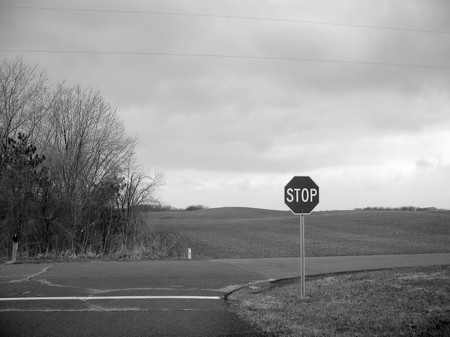- Recipe for a kick-ass drive to work: Black Sabbath’s PARANOID. (First heard, coincidentally, in Sean’s Golf.) I can usually get through “War Pigs” and “Paranoid” by the time I get to the library. Most people only credit Ozzy’s vox and Tommy Iommi’s guitar work for Sabbath’s greatness, but the rhythm section was unbelievably heavy and tight. Just listen to the way the bass moves under the power chords in “Paranoid.” Awesome, dude.
- Unrot your brain with video games? (Thanks, Don.)
- The Fez has been with everyone. (Don, again.)
- Lynda Barry is coming to Oberlin.
- And speaking of Lynda Barry, how the crap did I never see Matt Groening’s LIFE IN HELL comics? (Barry and Groening are friends.) A lot of his chart-like comics in one of the books remind me of Kenneth Koch… Check out this cool map charting the similarities between Springfield and Groening’s hometown of Portland.
- Don’t forget the reading tonight at Mac’s Backs.
I CAN’T AND I WON’T

a Circleville ‘scape…
- A column on the possibilities for storytelling in video games. “You’re not going to get anything on the level of [Citizen Kane] in video games until someone somewhere pays an honest-to-God writer to sit in a room and create a story themselves that they are passionate about telling through game play and visual narrative.” Once again, anybody heard of LucasArts adventure games?
- Somebody explain this hilarity to Sean. It’s like Chappelle’s Show without Chappelle.
- Looking for graphic novels without words?
- George Saunders on Peanuts.
- Lynd Ward novels you can browse through Google Books: God’s Man and The Silver Pony. Strange coincidence of influences: George Saunders credits Johnny Tremain by Esther Forbes as being the book that made him want to be a writer when he was young. Lynd Ward did the original illustrations for the classic.
- The Nabokov Library. Where you can find lots of his pieces for free, in .doc files.
THE GREATEST LOVE STORY OF THE 20TH CENTURY
Except for Reese Witherspoon’s performance, I thought WALK THE LINE could have been a made-for-TV movie, and I wondered why we needed it, anyways, with such great documentation of the Man In Black already: the autobiography, Cash’s video for “Hurt“, and especially Sarah Vowell’s radio essay, “The Greatest Love Story of the Twentieth Century,” about the song, “Ring Of Fire,” and Cash and June Carter’s relationship. (They essay starts 47 minutes into show.)
In this song, to compare love to fire isn’t just the music sexy/heat cliche like you give me fever, or, hunka-hunka burnin’ love, or, it’s gettin’ hot in here. This is fire as in brimstone. Old time religion. Written by the daughter of a people who believe in the eternal flames of hell. June Carter was coveting her neighbor’s spouse, which meant she was breaking one of the Ten Commandments. Loving Johnny Cash was a sin. And for her, the wages of sin were death. A death in which the sinner spent all eternity as nothing more than kindling. When June Carter admitted to herself that she loved Johnny Cash, it is, in a small country and western love song way, not unlike the moment Huck Finn resolves to help the slave Jim escape, even though he’s been told that doing so would be wrong. Alright then, he says, I’ll go to hell.
When you’re getting married, you’re looking around for models. Good examples. Blueprints that you can embellish.
The girls we are going to marry sat around the table, drinking beer, and one of them said, “How come in all these movies you see these artists and musicians leave their first wives after they get famous? Then they meet their soulmate and live happily ever after! The first wife never makes it. It’s scary.”
And I thought about it. Of most my heroes. John Lennon did that. Ray Carver did that. Johnny Cash did that.
And I thought about what I could learn. Other than, people change. I focused on that happy ending. On finding a woman who not only takes care of your soul, but challenges your mind. Your partner and your equal…
I CAN’T GO ON, I MUST GO ON

Suggested steps for dealing with the upcoming apocalypse:
- Build up your hatred of fossil fuels and the religious right: “The precedents of past leading world economic powers show that blind faith and religious excesses — the rapture seems to be both — have often contributed to national decline, sometimes even being in its forefront.”
- Curl into the fetal position with a Harpoon Hibernian Ale.
- Listen to some free Stanford lectures on stress.
- Read some Kochalka in italian. Listen to the “Hockey Monkey” EP. Dream about American Elf, Book two.
- Take solace in the fact that we are not alone. Technology harnessed by UFOs could one day solve the world’s energy problems and save the world…ha!
LIKE I NEED A HOLE IN THE HEAD

blown-up panel from my new comic
- Seen a UFO? Report it. Track them here.
- Article on Richard Linklater’s use of rotoscope animation for his new Phillip K. Dick adaptation. Rumors that Radiohead will be on the soundtrack. That seems like a good match, although I personally thought Waking Life was a pantload. Still, it’s a cool technique. Take on me, baby.
- Michael Gondry is nutso.
- Anatomy of a scene from V for Vendetta.
- Calexico has a new album coming? Check out their live archive. And the NPR show.
- Ghostface and Green Lantern: Internet Invasion. Greatest job in the world archives.
- This week is definitely the one week it’s cooler to be in Austin than to be Austin.
- ← Newer posts
- 1
- …
- 331
- 332
- 333
- 334
- 335
- …
- 346
- Older posts→







